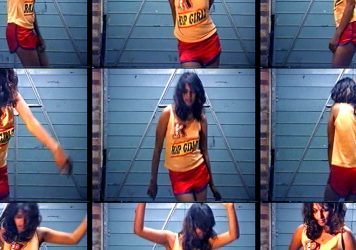Eva Vitija's thoughtful documentary is a measured look at a singular, enigmatic literary voice.
To say that Patricia Highsmith is a controversial figure is an understatement. The brilliant nastiness of her crime thrillers has led to an ongoing and insatiable appetite for film adaptations. From Hitchcock’s Strangers on a Train (1951) to Anthony Minghella’s The Talented Mr Ripley (1999), from René Clément’s Purple Noon (1960) to Adrian Lyne’s Deep Water (2022).
Yet that nastiness was not restricted to fiction. Any one of her three biographies records her racism, particularly a caustic seam of anti-semitism. With this image calcifying in the public domain, it is no mean feat that Swiss director, Eva Vitija, has succeeded in complicating our understanding of Highsmith with an intimate docu-portrait that strives not to be definitive, rather to rigorously carve a personal thesis out of primary research.
Highsmith kept private diaries and notebooks from the age of 21 to several years before her death at 74, amounting to 8,000 handwritten pages, published in 2021 in an abridged form. Vitija had early access to the full source through the Swiss Literary Archives and has supplemented these archival riches with her own independent detective work, conducting interviews with surviving family members and key lovers from Highsmith’s sexually voracious life. The charms that enabled Highsmith here cast a spell on Vitija too. “When I started reading her unpublished diaries, I fell in love with Patricia Highsmith herself”.
To those coming to the film with a set image of a cold misanthrope, the passionate emotion of the diary entries are as startling and pleasurable as sinking your body into a hot tub in mid-winter. Born to a mother who did not love her and tried to force her to marry a man against the grain of her lesbian desires, Highsmith entered therapy in an attempt to convert herself to heterosexuality.
This biographical information is scattered lightly around the main meat of the film which, as the title suggests, is dedicated to those that loved her, if only briefly. Exes to add their testimonies include fellow iconic US lesbian author, Marijane Meaker (who wrote under the pen names Ann Aldrich, M. E. Kerr, Mary James, Vin Packer and Laura Winston) as well as the German actress and creative polymath, Tabea Blumenschein.
Each vignette is illustrated with a transporting selection of old photos, audio and TV footage, with diary entries read by Gwendoline Christie and Vitija’s own first-person narration binding a patina of memories together. As Highsmith ages, bitterness and resentment harden into place. She writes of tumultuous disappointments, “My life is a chronicle of unbelievable mistakes, things I shouldn’t have done and vice versa.”
This is not – and does not try to be – an exhaustive biography, it is a form of emotional impressionism that works because Vitija understands the boundaries of her project and keeps a focus on illustrating her vision in the most vivid, high-quality colours. Figures like Highsmith command our fascination because they are essentially unknowable. After all, the creator of compulsively grubby crime novels, also gave us the overpowering romance of Carol. It is tempting to want people to be one thing or the other: the murderer or the victim. This film reminds us: Highsmith was both.
Little White Lies is committed to championing great movies and the talented people who make them.
Published 13 Apr 2023
The inside track on Patricia Highsmith’s love life? Yes please.
A labour of love from a researcher turned detective.
Lays bare the turmoil bubbling beneath Highsmith’s cold image, both enriching and deepening our understanding of her fiction.

By Elena Lazic
Ana de Armas and Ben Affleck play spouses engrossed in a twisted game of cat and mouse in director Adrian Lyne’s long-awaited return.

By Leigh Singer
A side-by-side analysis of Purple Noon and The Talented Mr Ripley, as adapted from Patricia Highsmith’s 1955 novel.

By Ed Gibbs
Director Steve Loveridge was granted unprecedented access to singer-activist M.I.A, but does it meaningfully enhance his film?